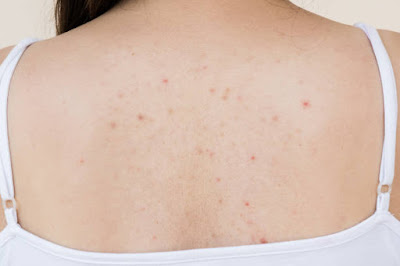Body Acne
Body acne, also known as bacne, is a common skin condition that
occurs when hair follicles become clogged with oil and dead skin cells. This
can lead to the formation of pimples, blackheads, and whiteheads on various
parts of the body, such as the back, chest, and shoulders.

Several factors can contribute to the development of
body acne, including hormonal imbalances, genetics, and certain medications.
Sweat and friction from clothing can also exacerbate the condition.
To treat body acne, it’s important to keep the affected areas clean
and dry. You can use a gentle, non-comedogenic cleanser to wash the skin, and
avoid using abrasive scrubs or loofahs that can irritate the skin. Wearing
loose-fitting clothing made from breathable fabrics can also help reduce
friction and sweat buildup.
In addition, over-the-counter topical treatments that contain
ingredients like benzoyl peroxide, salicylic acid, or alpha hydroxy acids
(AHAs) can be effective in reducing inflammation and clearing up acne. For severe
cases, prescription-strength topical or oral medications may be necessary.
It’s also important to maintain a healthy diet and lifestyle, as
diet and stress can play a role in the development of acne. Regular exercise
and stress-reducing activities like yoga or meditation can help improve overall
skin health.
Body acne causes
Body acne can be caused by several factors, including:
- Hormonal
imbalances: Hormonal changes during puberty, menstruation, pregnancy, and menopause
can lead to increased sebum production and clogged hair follicles, which
can result in acne breakouts. - Genetics:
A family history of acne can increase the likelihood of developing body
acne. - Certain
medications: Some medications, such as corticosteroids and androgens, can
stimulate sebum production and contribute to acne development. - Poor
hygiene: Not showering regularly or not washing sweaty clothing can
contribute to the buildup of bacteria and oil on the skin, leading to
acne. - Sweat and
friction: Tight clothing, backpacks, and other items that rub against the
skin can cause friction and irritation, leading to acne development. - Skincare
products: Certain skincare products, such as those that contain heavy oils
or fragrances, can clog pores and lead to acne breakouts. - Diet:
High-glycemic-index foods, such as sugary and processed foods, can trigger
an insulin response that stimulates sebum production and leads to acne.
It’s important to note that body acne can be caused by a
combination of these factors, and individual triggers can vary from person to
person.
Body Acne Treatment
The following are some treatments for body acne:
- Topical
treatments: Over-the-counter topical treatments that contain ingredients
like benzoyl peroxide, salicylic acid, or alpha hydroxy acids (AHAs) can
be effective in reducing inflammation and clearing up acne. These products
can be applied directly to the affected areas. - Prescription
medications: For more severe cases of body acne, prescription-strength
topical or oral medications may be necessary. These may include
antibiotics, retinoids, or hormonal medications. - Light
therapy: Light therapy, also known as phototherapy, uses light to kill the
bacteria that cause acne. This can be done in a doctor’s office or at home
using a special light device. - Chemical
peels: Chemical peels use a chemical solution to remove the outer layer of
skin, which can help to unclog pores and improve the appearance of acne
scars. - Lifestyle
changes: Maintaining a healthy diet and lifestyle can also help to improve
body acne. Eating a diet rich in fruits, vegetables, and whole grains,
getting regular exercise, and managing stress can all help to improve
overall skin health.
It’s important to note that it may take some time for acne
treatments to show results, and it’s important to be consistent with treatment
and follow a skincare routine that works for you. If you have severe or
persistent body acne, it’s best to consult with a dermatologist for
personalized treatment recommendations.
Body Acne treatment at home
Several home remedies can be used to help treat body
acne:
- Tea tree
oil: Tea tree oil has antibacterial and anti-inflammatory properties that
can help to reduce acne breakouts. Dilute tea tree oil with carrier oil,
such as coconut oil, and apply it directly to the affected areas. - Aloe vera:
Aloe vera has anti-inflammatory properties that can help to soothe
irritated skin. Apply fresh aloe vera gel to the affected areas. - Apple
cider vinegar: Apple cider vinegar has antibacterial properties and can
help to unclog pores. Mix equal parts of apple cider vinegar and water and
apply the solution to the affected areas using a cotton ball. - Oatmeal:
Oatmeal can help to absorb excess oil and soothe irritated skin. Mix
ground oatmeal with water to make a paste and apply it to the affected
areas. - Honey:
Honey has antibacterial properties that can help to reduce acne breakouts.
Apply raw honey directly to the affected areas and leave it on for 10-15
minutes before rinsing off.
It’s important to note that while these home remedies can be
effective for some people, they may not work for everyone. If you have severe
or persistent body acne, it’s best to consult with a dermatologist for
personalized treatment recommendations.



